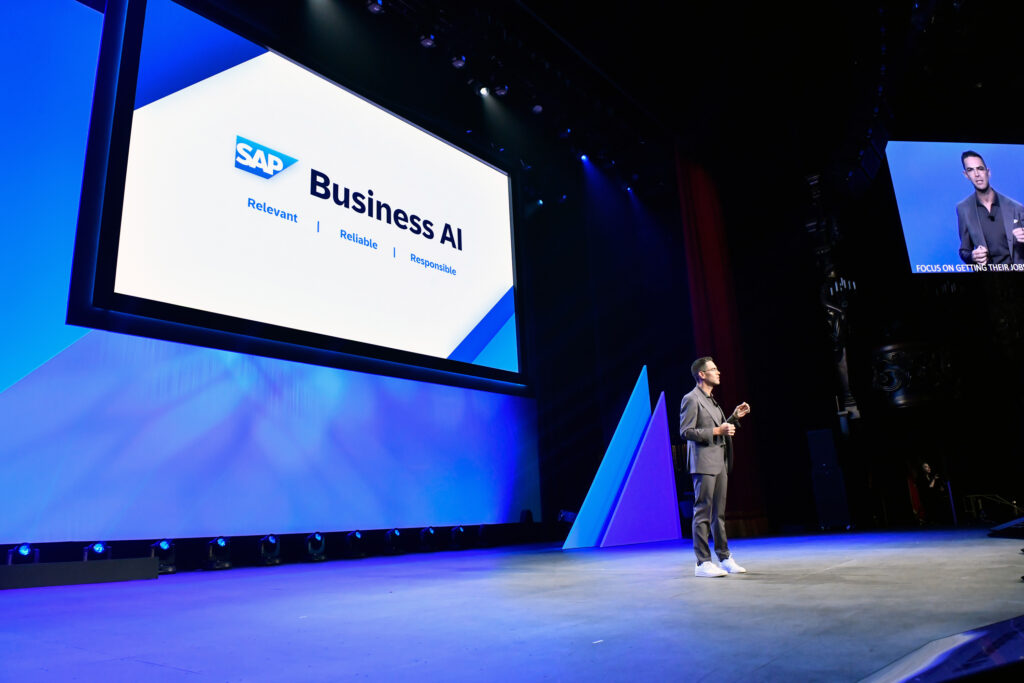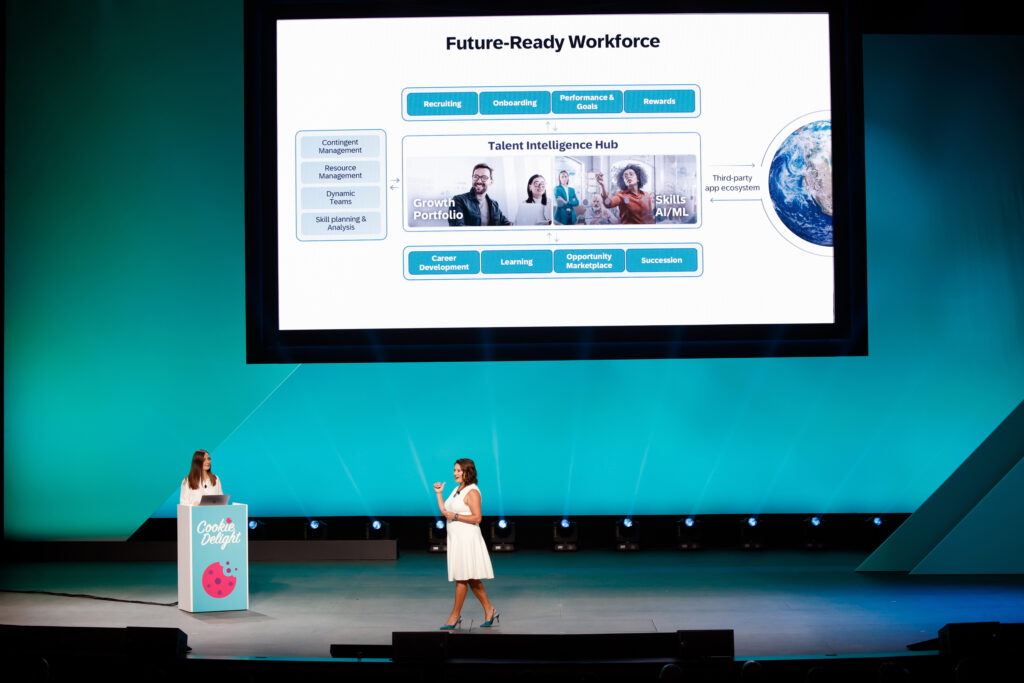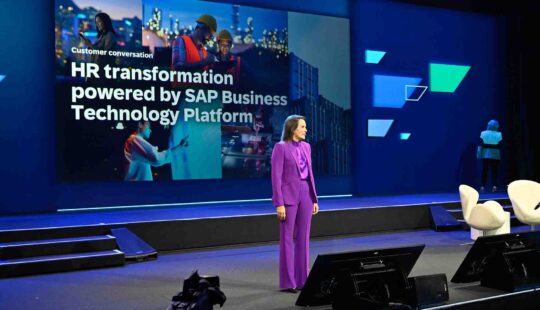The intense competition for skills is compelling organizations to modernize their talent strategy. A future-ready workforce needs new skills and faster adaptability to keep pace with innovation and thrive in a rapidly changing world. HR leaders – as the organization’s champions of people development and culture – are at the forefront of a revolution in employee learning, growth, and skill development. That revolution is being driven by advancements in artificial intelligence (AI).
AI will truly inspire and transform the way people work and how organizations unlock individual and collective potential.
To advance this transformation, SAP announced new capabilities at its SuccessConnect event that harness the power of AI to help organizations address the skills gap and ignite the potential within their workforces. These capabilities are embedded across the entire SAP SuccessFactors Human Experience Management (HXM) Suite to help elevate the employee experience and guide every people decision, from talent recruitment and internal mobility to learning and performance management.
“The richest source of potential in your organization is your workforce, all that they are today and all that they can be in the future,” said Aaron Green, SAP SuccessFactors chief marketing and solutions officer, speaking to the global HR community at SuccessConnect, held last week in Las Vegas, Nevada. “This is an opportunity for us to embrace AI to augment the way that people work and that’s how we ignite their potential. This allows us to maximize the skills within our workforces.”
Putting People at the Center of Business
Human experience management, an HR software category pioneered by SAP SuccessFactors, puts people at the center of business with tools and technologies that help improve the employee experience and drive business results.
The SAP SuccessFactors 2H 2023 release will include the general availability of new AI capabilities that can ignite potential in the workforce by raising employee productivity, increasing efficiency, and opening opportunities for growth and development. Joule, recently announced by SAP, is a natural-language, generative AI copilot that can truly understand business. Joule helps make it easier and faster for employees to navigate complex processes and for HR teams to respond to requests. In addition, new generative AI use cases help HR teams to elevate talent, recruiting, and learning.
SAP SuccessFactors solutions are part of the overall SAP portfolio, one of the broadest suites of business applications available, all powered by SAP Business Technology Platform (SAP BTP). The latest innovations in SAP SuccessFactors HXM Suite are powered by SAP Business AI to be relevant, reliable, and responsible. Learn more here.
“We are in a phase of rapid acceleration of AI,” said Green, who described how new AI use cases “will drive an outright transformation of two core facets of every organization: the way that people experience work and the way that we can unlock that individual and collective capability. That’s why we’ve delivered SAP Business AI that is truly built for business.”

Talent Intelligence Hub: The Engine of a Skills-Based Organization
Skills-based organizations, where skills take precedence over roles and titles, benefit through improved business agility and employee experience. The key to building a skills-based organization is the ability to accurately assess the current skills and capabilities of the entire workforce, identify skills that are needed for the future, and implement a learning and talent strategy that can effectively address the gaps.
As the engine of a modern, skills-based organization, the talent intelligence hub is an AI-powered skills framework built into SAP SuccessFactors HXM Suite that can drive an organization’s entire learning and talent strategy. Customers can benefit from having a single skills model that covers recruiting, onboarding, learning and development, performance, and succession. With a holistic view of the workforce based on skills data from multiple locations, they can make data-driven talent decisions and can more easily identify the right candidates for jobs.
Employees are empowered to take charge of their careers by guiding their own career development. The talent intelligence hub allows them to build and manage an individual growth portfolio, which includes their skills, competencies, aspirations, motivations, and work styles. Based on this data, they can receive personalized talent development recommendations, which can include assignments available on SAP SuccessFactors Opportunity Marketplace, mentors, and dynamic teams. The talent intelligence hub is now generally available.
“AI has arrived just at the right period of time to give us this productivity boost we need to grow,” Josh Bersin, industry analyst, shared in the keynote. “So, if you have an old-style management leadership team that says hire, hire, hire, hire…that’s not going to work anymore. It’s going to be automate, improve, redesign, reorganize – and that’s why these embedded AI tools like SAP SuccessFactors produce will be essential to your company’s growth.”
Delta Air Lines: Skills Development Advances Business Strategy
Delta Air Lines is one company that is evolving to become a skills-based organization. An early adopter of the talent intelligence hub in SAP SuccessFactors solutions, Delta is building an employee experience focused on skills development and continuous learning that supports its business strategy. Employees will be able to maintain their own individual growth portfolios of skills and competencies and receive personalized learning recommendations for their skill development and career growth.
“Delivering an elevated employee experience is important to us,” said Tim Gregory, managing director of HR Innovation and Workforce Technology at Delta. “We want a winning workforce and that means being able to attract the best and brightest from everywhere. We need to be able to see this talent through a skills lens. Our people work hard to develop and hone their skills. It’s personal, and when Delta is able to go beyond the traditional lens of job hierarchies and org charts, we create the elevated experience that attracts and retains the best talent.”
Through its skills-first talent strategy, Delta eliminated degree requirements for more than 90% of non-executive roles in an aim to close the opportunity gap for talented employees who have been skilled through alternative pathways – emphasizing the retention and advancement of internal talent based on skills, competencies, and experience as a key driver of career mobility.
Delta has set a long-term goal of filling 25% of its corporate and management openings with current talent that is in customer-facing roles. An internal review of job descriptions revealed that many jobs required a college degree. Gregory said, “We asked ourselves, do we care more about where their skills came from or if they have skills, are proficient in skills, are excelling in skills?”
Eliminating unnecessary degree requirements has enabled Delta to move ahead in its goal of advancing more frontline employees with customer experience into its managerial ranks, which has benefits for its business strategy and customer focus.
This is just one example of how Delta uses the talent intelligence hub to drive individualized talent development and put employees at the center of its transformation. Read more here.
The Power of the Talent Intelligence Hub
The power of the talent intelligence hub was clearly shown during a demo on the main stage at SuccessConnect. Amy Wilson, senior vice president of Product and Design at SAP SuccessFactors, underscored the advantages of integrating talent intelligence within the SAP SuccessFactors HXM Suite. “You will benefit from the simplicity and the power of a unified talent lifecycle – with a common language and a shared set of insights. And this extends beyond HXM to our entire SAP ecosystem,” she said, highlighting SAP S/4HANA, SAP Fieldglass solutions, and partner applications. “We are leveraging this rich data to dramatically improve the individual experience, from inferencing skills based on talent data to creating recommendations in the SAP SuccessFactors Opportunity Marketplace to our brand-new learning experience.”

The demo followed the talent journey of Jada, a retail associate at fictitious Cookie Delight, who has big aspirations to participate in the product launch of a new line of cookies. AI-generated learning recommendations guide Jada as she builds out her skills profile to apply for an assignment on the product launch team.
In SAP SuccessFactors Learning, Jada can see personalized learning recommendations matched to what she needs to learn to stay compliant, what she needs to learn to succeed in her current job, and what she wants to learn. After she completes a course, her skill level in her individualized growth portfolio is updated to “advanced.” In SAP SuccessFactors Opportunity Marketplace, she finds an assignment to help with the new product launch and applies for the opportunity. “We’ve made it even better with this release,” said Wilson. “We’ve added top picks for you, which are recommendations based on your skills and interests. And now the opportunities find you.”
The Future of Work Takes Off with AI
SAP has been helping organizations run their business processes for 50 years. Siva Sundaresan, senior vice president of Applications Engineering at SAP SuccessFactors, provided a perspective for HR leaders on what the new AI capabilities will mean for the future of work.
“At SAP, we are committed to implementing AI with ethics, privacy, and security at the forefront,” he said. “We have led the market in human experience and we are excited to help you embrace systems of intelligence. Talent intelligence is just the beginning. We will expand AI use cases across our portfolio. When you include HR, finance, supply chain, customer experience – that’s when you can truly transform the business.”
To learn more about creating skills-based organizations, register for this webinar, to be held on November 8, 2023 at 11:00 a.m. EST.



